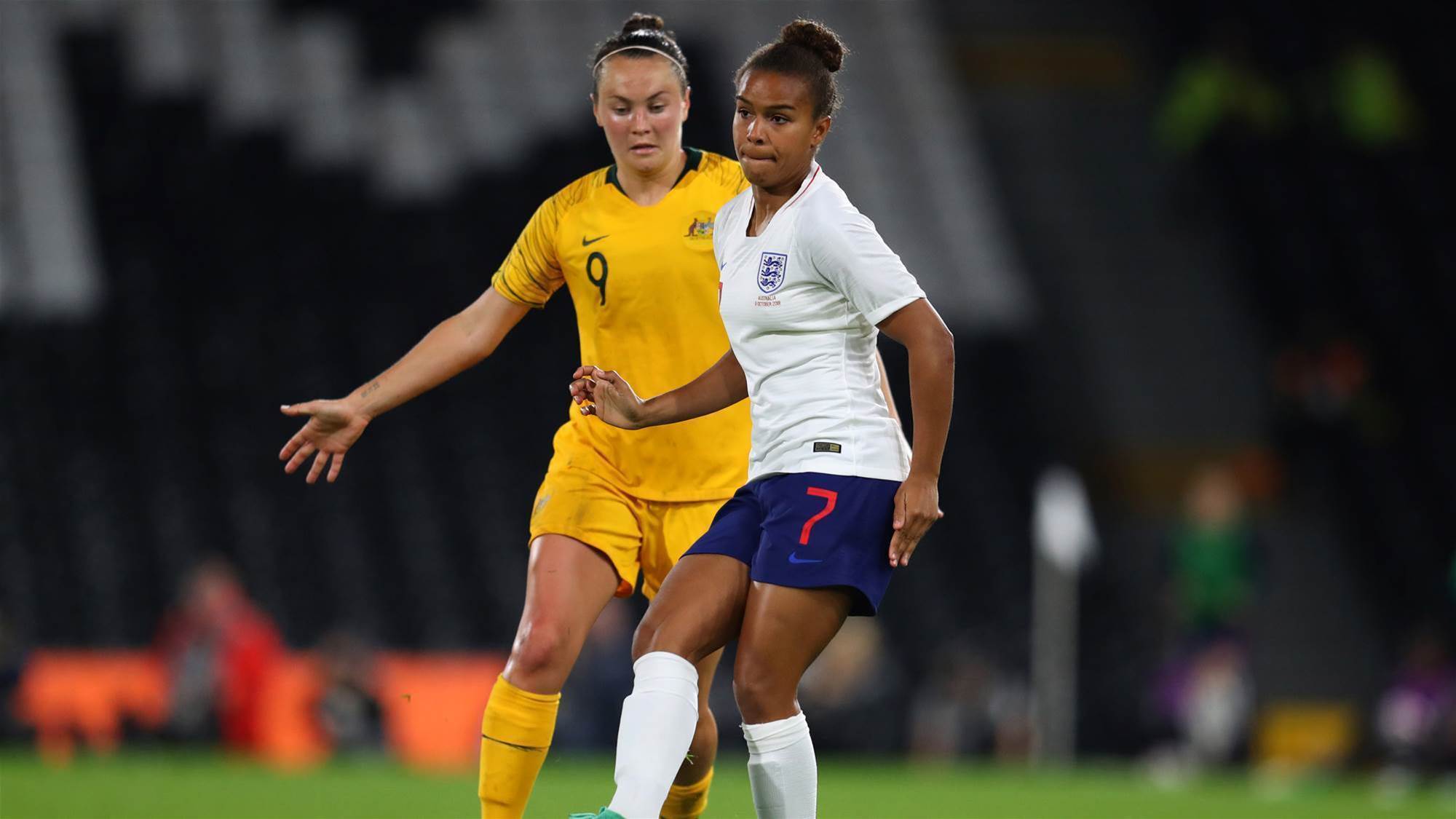A late Clare Polkinghorne header saw the Matildas snatch a 1-1 draw against World No. 3 England at London’s Craven Cottage early this morning.
However, the final scoreline flattered the Aussies, masking several individual and tactical errors. Here are five things we learned:
1. Versatility is a blessing – and a curse
 Matildas coach Alen Stajcic has made a habit out of moving players from their preferred positions, whether to cover for players who are out of form, unavailable, or simply as an experiment. Today was no exception.
Matildas coach Alen Stajcic has made a habit out of moving players from their preferred positions, whether to cover for players who are out of form, unavailable, or simply as an experiment. Today was no exception.
In the absence of experienced centre-half Alanna Kennedy, left fullback Steph Catley was moved in-field to be paired with Clare Polkinghorne. Caitlin Foord, usually a left winger, filled in for Catley at left fullback.
These two shifts had a significant impact on the game. While
Catley’s speed and wicked left foot make her one of the best fullbacks in the world, her move to the centre of defence saw the Matildas lose that attacking option. This resulted in a lack of service for other attackers like Chloe Logarzo, Lisa De Vanna, and Mary Fowler. While Catley did an excellent job holding the line alongside Polkinghorne, it is worthwhile asking whether her defensive cover is more valuable than what she offers in attack.
Further, while Foord made a name for herself at right fullback during the 2015 World Cup by marking Brazilian superstar Marta out of the game, she has not played in a defensive position for several years. That lack of recent defensive experience was on display today as Foord was regularly turned around by English winger Beth Mead.
More concerningly, Foord was involved in two penalty shouts by the England team, sandwiching Mead in the box and then tripping over Mead’s replacement, Nikita Parris. Were it not for some curious refereeing decisions, Foord’s poor decision-making in these moments could have cost Australia the game.
Versatility is a great attribute to have as a footballer; your role in a game can change unexpectedly and instantaneously. However, in a footballing climate where specialisation is becoming the norm, Stajcic must decide on which attributes will best maximise the abilities of individual players and contribute to the success of the team as a whole.
2. Refereeing standards are not always up to par
The scoreline masks a number of cracks created by poor refereeing, with a pair of goals denied, and two penalty kicks waved away.
First, a 34th minute corner by England resulted in what appeared to be a goal bundled over the line by Mead. However, the referee on the far touchline did not judge the ball to have crossed the line entirely, despite their perspective being obscured by the goal post. The lack of goal-line technology meant there was no way to overturn the referee’s decision, and the game played on.
Just 10 minutes later, and much more controversially, the same sideline referee ruled a goal to England’s Lucy Staniforth offside. After in-form striker Fran Kirby teed up Staniforth at the back post, the referee raised her flag, even though replays showed that Staniforth was behind Kirby before the final pass. Again, the lack of VAR meant there was no way England could have the decision overturned.
The Lionesses could have used VAR twice more when Mead and Parris were each brought down in the penalty area. The trip by Foord on Parris in the 80th minute was unmistakable but the referee waved it away, much to the visible anger of Parris and to the boos of the London crowd. The obviousness of the errors should be a wake-up call to the Matildas, who were effectively saved from a possible 4-1 loss by poor refereeing. They should not expect to be so lucky next time.
3. There’s no substitute for professionalisation
 Heading into the first friendly against France, it was understood that several Matildas were carrying small injuries. These niggles undoubtedly contributed to the underwhelming performances of some players.
Heading into the first friendly against France, it was understood that several Matildas were carrying small injuries. These niggles undoubtedly contributed to the underwhelming performances of some players.
Their busy schedules – juggling between national team duty and various club competitions in Australia and abroad – meant they hadn’t been given enough time to rest their minds and bodies. Indeed, rest is one of the main reasons several key Matildas did not even make the trip.
This is not a new problem for Australia’s women footballers, but it is a problem that will get worse if it is not addressed within the next few years. The vast majority of the England and France players now ply their trade in fully professional leagues, meaning they aren’t forced to travel around the world chasing contracts to keep their careers afloat.
Professional contracts and conditions mean these players can train and recuperate in a manageable cycle and environment, which translates into a higher competition for national team places and more consistent performances. Giving the Matildas similar time and support to rest and repair in the lead-up to major tournaments like the World Cup should be a top priority.
Football is a short game, but the time that goes into preparing for those 90 minutes is extensive, spanning from months to years. With the increased interest and investment in women’s football around the globe, it’s important that Australia is not left behind if we want to remain competitive on the international stage.
4. The kids are alright
 Despite the aforementioned issues that extend far beyond these recent friendlies, this morning’s match against England was not all doom and gloom.
Despite the aforementioned issues that extend far beyond these recent friendlies, this morning’s match against England was not all doom and gloom.
Amy Sayer, 16, impressed in her starting debut in midfield, looking sharp and comfortable on the ball, and providing some much-needed attacking thrust through the central channels.
Sayer’s Sydney FC teammate, 18-year-old Princess Ibini was also full of legs, applying pressure to the England defence and attacking down the right wing. Twice Ibini got in behind her defender and forced two big saves by England goalkeeper Mary Earps.
Mary Fowler, 15, was given a solid 25 minutes to impress the England crowd, which she did almost immediately, sending a rocket over the crossbar after turning experienced centre-half Steph Houghton.
And despite a rocky first half, 18-year-old right full-back Ellie Carpenter came alive in the second, charging upfield and forcing Earps into a fingertip save that led to the equalising corner.
In a team that looked tired and out of ideas at times, these young guns brought spark and unpredictability. The Matildas are not unusual for ‘blooding’ young players, but it is how these bright talents are nurtured and supported in the next few years that will be key to their future successes.
5. Don’t panic!
 A loss to World No. 4 France and a draw against World No. 3 England may not have been the desired outcomes of these two friendly games for Stajcic, the team, or the fans. But it is important to keep in mind three things:
A loss to World No. 4 France and a draw against World No. 3 England may not have been the desired outcomes of these two friendly games for Stajcic, the team, or the fans. But it is important to keep in mind three things:
First, the Matildas were missing several core players in Williams, Kennedy, Raso, Van Egmond, Gorry, and Kerr. As such, a number of fringe players, including Gielnik, Crummer, and Luik, saw significant minutes on the park. This was, of course, one of the purposes of these friendlies, to get a clearer picture of what a final World Cup squad could look like. It’s not perfect yet.
Second, as has been mentioned, several players came into these games carrying injuries or are returning after long-term layoffs, which could have affected their performances in various ways.
And third, both the English and French sides are in the middle of their main club seasons; their players already match fit and in a competitive mindset. By contrast, many Matildas are in the downturn from their respective competitions at home and abroad, some not having played for several weeks.
Despite the setbacks, Australia walks away from these games against two powerhouses of women’s international football with a loss and a draw. While these games raised a number of questions, we must keep perspective and have faith that within the next eight months, many of those questions will be answered.
Related Articles

'Timing not right': Montemurro's verdict on Matildas vacancy

Matildas: 'Fourth at the Olympics is honestly the worst place you could come'
.jpg&h=172&w=306&c=1&s=1)












